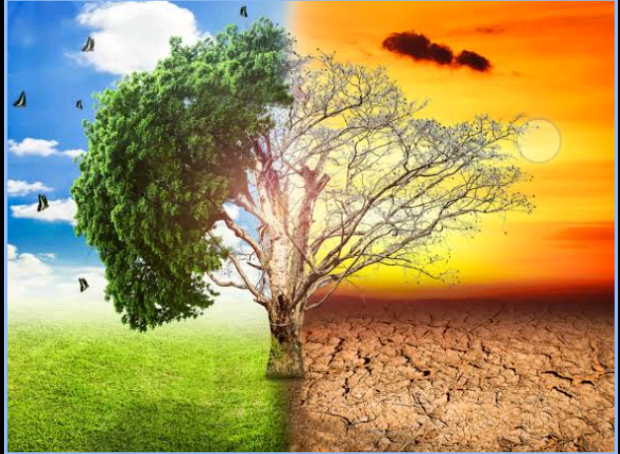The intimate interaction between man and his environment is clear. And that human activities have been affecting the environment, and the environment in turn affects us deeply should no longer be taken for granted.This is extremely true in view of significant climate change in Nigeria and across the world, currently taking place. Particularly in the last two centuries thereabout.
Humans can achieve little or nothing without the environment. Because we get all the resources, tools, and necessities to survive and prosper from the environment.
But industrialization, mining activities, and innovations in technology promoted the use of fossil fuels from coal and crude oil to generate energy. Especially since the discovery of crude oil in the 19th century USA. In fact since the discovery and exploration of crude oil began on the Earth, there have been mixed blessings.
Climate Change in Nigeria and Across the Globe: The Causes
Firstly, we have had to deal with high carbon emissions from burning crude oil and its derivatives, released into the ecosystem. In places where crude oil was not the culprit, it was the excessive burning of wood and coal, and forest clearing with fire. This is of course a global problem.
Extensive deforestation to accommodate real estate and construction projects hugely contributed to damaging the ecosystem. Because this operation disregarded the role of trees and plants in purifying the air and soil. Not to mention disregarding the way plant roots hold the soil together. Water bodies and the soil have also been choked up with crude-oil derived plastic indiscriminately thrown around.
This has caused serious damage to the atmosphere, soil and water bodies in the affected countries and communities, particularly within the last one century. Several plants and animals have also died or been seriously wounded in the process.
A high proportion of these high carbon emissions took place in developed nations such as the USA and Europe. So for a while it appeared to be their concern and responsibility only. However, elements in the environment are constantly on the move – at least we know of air and water. Thus the effects of climate change are felt everywhere across the globe, regardless of the sources.
Like it or not, both the developing and developed countries have played a role in damaging the environment. And all countries must collectively tackle the climate change crisis. This is necessary to protect their local communities from the devastation of adverse climatic conditions.
Again, certain host communities where crude oil is mined, experienced uncontrolled gas flaring and oil spillage for years. Soil, water and air pollution took place at astronomical levels, badly affecting the health and livelihoods of the dwellers in these communities. This is so true of the Niger Delta regions of Nigeria, where crude oil is mined both onshore and offshore.
Climate Change in Nigeria: The Specific Challenges and Effects
Of necessity, former Nigerian president Muhammadu Buhari signed the Climate Change Act 2021. The act was intended to provide a framework for implementing climate change plans, and to reduce greenhouse gas emissions nationwide. Prior to this, reliable sources revealed that from 1971 to 2020, Nigeria’s carbon dioxide emissions continued to increase every year. By 2020, carbon dioxide emissions.in Nigeria had reached 126.9 million tonnes.
Not only that, out of about 32 million tons of solid waste generated yearly in Nigeria, about 2.5 million tonnes are plastic waste. This makes Nigeria one of the largest producers of waste across Africa. Quite unfortunately, waste management and waste recycling in Nigeria is still poorly handled and underfunded. Indeed some environmental experts are worried that Nigeria does not have the financial means or technical know-how to combat the climate change crisis.
Even more critical is the fact that Nigeria largely depends on its crude oil to generate both foreign exchange and energy. About 95% of the country’s foreign exchange comes from crude oil. And about 48.6 percent of electricity in Nigeria is currently generated from diesel and petrol generators. This includes businesses and households. Putting in place strict measures to cut down on fossil fuels consumption and switching to alternative sources of energy is now critically needed. This is a necessary move to curtail excessive production of carbon and greenhouse gases.
The effects of climate change in Nigeria are already unfolding on a massive scale. The northern regions of Nigeria were already occupied by the Sahara desert and thinning vegetation. Now, coupled with dry weather, droughts and further desertification is on the increase. Lake Chad to the northeast is now a mere 1300 square kilometers in area, compared to around 40,000 square kilometers about 40 years ago. And cattle herders in the North are driven further southwards in search of fresh pasture for their flocks. They have subsequently clashed with farmers whose crops have been destroyed and eaten by the roaming cattle.
For over a decade now, there have been cases of mass flooding and abnormally heavy rainfall every year, down south of Nigeria. This problem is typical of the coastal areas of Nigeria, the Niger Delta region, and the southeast and southwest regions. One such extreme case happened in 2012, and several others have occurred afterwards. Many lives and properties have been lost in the process. There is also the threat of rising sea levels, storms, and warming of the ocean and lagoons. The southeastern part of Nigeria is also facing severe gully erosion and landslides, especially during the rainy season.
One should not forget that thousands of people have been displaced from their homes and ancestral lands. Especially indigenes from Northern Nigeria. Apart from communal clashes, climatic and environmental disasters have been responsible for a large percentage of internally displaced persons in recent years. The situation is becoming more critical every passing year.
Proposed Solutions to the Climate Change Crisis in Nigeria
Tackling the effect of climate change in Nigeria is part of the global collective to control the damaging effects of climate change. And it is necessary. To achieve this, experts, concerned individuals and organizations are on the drive to implement these and other initiatives across Nigeria. The role of the government in spearheading and supporting these initiatives is also very critical.
Otherwise if we neglect the climate change crisis, our environment and people face grave danger to life and survival.
Thus we agree that the following measures need to be implemented to curb the advancing threat of climate change in Nigeria:
- Carrying out media campaigns and sensitization of the general public. Thus will inform citizens on the effects of climate change and need for collective, positive action.
- Integrating the study of climate change into the Nigerian curriculum at all levels, from primary to tertiary institutions.
- Financial empowerment of university lecturers to embark on research relating to climate change. This will help them to develop viable solutions and technology that will mitigate the crisis.
- Reviving tree-planting, grass and cover crop sowing programs. It should be made widespread across the country.
- Landscaping and beautification activities across several communities need to be encouraged.
- Outlawing or restricting the use of diesel vehicles and industrial machinery. And that generators should probably be banned or restricted as well.
- Intensifying waste management and recycling operations across the country. In fact, private sector operators need to be supported and encouraged by the government.
- Implementing stricter measures at national, state and rural levels to control environmental pollution.
- Actively promoting the use of renewable energy sources in industries and homesteads. Solar and wind generators and equipment need to be vigorously promoted.
- Government and financially capable change makers need to deploy relevant and effective technologies into as many Nigerian communities as possible. These technology equipment will help to slow down or stop the effects of climate change.








